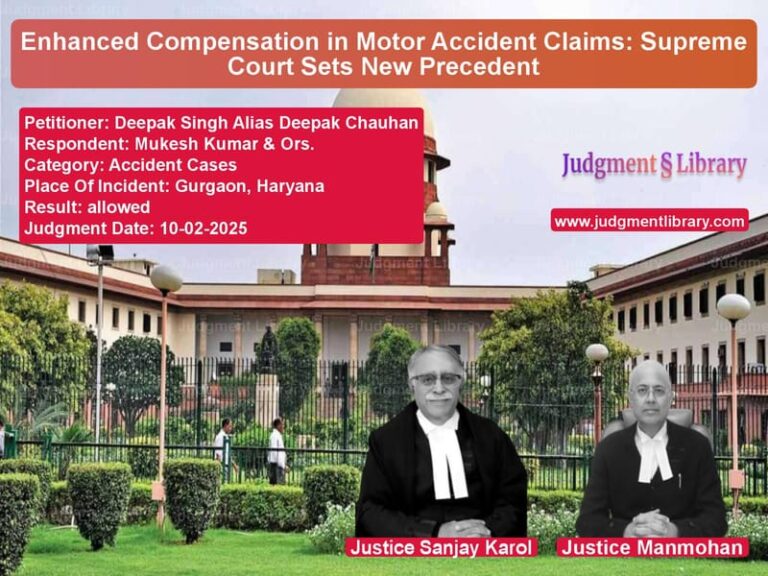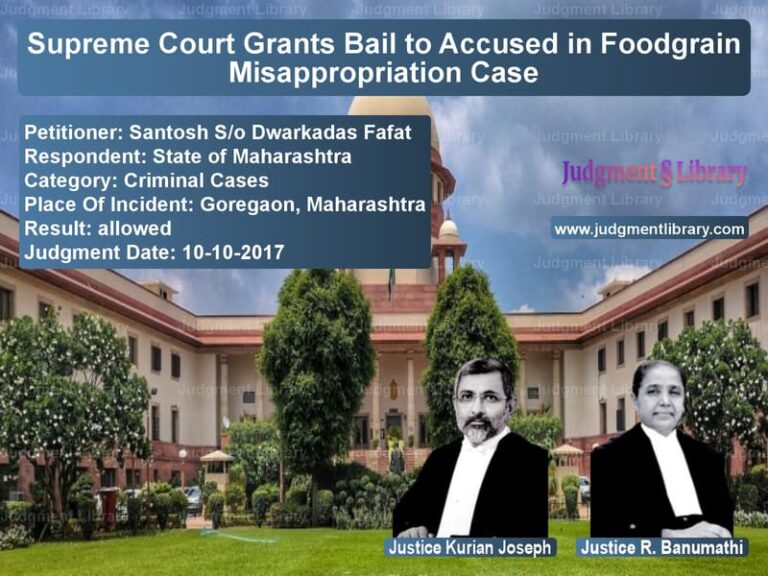Supreme Court Remands Property Ownership Dispute Case Back to High Court
The Supreme Court recently rendered an important judgment in the case of State of Uttarakhand & Ors. v. Ravi Kumar (Deceased) through LRs and others, a matter involving complex land ownership disputes. The core issue concerned the ownership rights over 28.56 acres of land in Village Haripur, Tehsil Haldwani, District Nainital, which had been the subject of multiple legal proceedings over decades. The Court’s decision primarily focused on the question of ownership rights, tenancy laws, and the legal validity of revenue entries in the land records.
Background of the Case
The roots of the dispute can be traced back to June 20, 1924, when a lease agreement was executed between Mr. John Vaughn and the then colonial rulers of India. The lease was for thirty years and was extendable under the terms of the lease. The leased land, referred to as the “Suit Land,” went through several legal transitions over the years, with various revenue entries, mutation proceedings, and legal claims emerging along the way. The matter escalated as the land was transferred to Mr. Manohar Lal through a Sale Deed dated November 17, 1947. The controversy intensified over the status of the respondents, who claimed ownership of the land through a series of legal processes that followed, including mutation proceedings and eviction suits.
The Lease Deed and Subsequent Sale
The initial lease agreement was signed in 1924 for thirty years, with provisions for renewal and conditions about the transfer of leasehold rights. In 1947, Mr. Manohar Lal, the respondent’s predecessor, entered into a sale agreement for the Suit Land with approval from the then colonial authorities, although the lease conditions required prior approval from the Deputy Commissioner for such transactions.
The 1967 Eviction Suit and Mutation Proceedings
The State filed an eviction suit in 1967, asserting that the land had been illegally transferred and that the respondents were in unauthorized possession. This case was transferred to the prescribed authority under the UP Public Premises (Eviction of Unauthorised Occupants) Act, 1972, where the suit was dismissed in 1975 on the grounds of non-maintainability. Despite multiple appeals and revisions, the respondents continued to hold possession, with their name entered in the revenue records as ‘Bhumidhar,’ a legal status conferred under tenancy laws.
Government’s Claim for Ownership
The government argued that the lease agreement had expired in 1954, and the land had automatically reverted to the State. It also contended that the revenue entries in favor of the respondents were incorrect, and the land should be restored to the government’s possession. The dispute became further entangled in various proceedings, including mutation proceedings in 1978 and a long-running series of appeals challenging the government’s actions to expunge the respondents’ revenue entries.
Legal Arguments Presented by the Appellants
The appellants, representing the State of Uttarakhand, raised the following key arguments:
- The land was initially leased under specific terms, including the requirement for prior approval from the Deputy Commissioner before any transfer. Since no such approval was obtained, the respondents’ possession was unlawful.
- The respondents’ status as ‘Bhumidhar’ was legally flawed, as the initial lease had expired in 1954, and no further renewal or lease agreement was made.
- The revenue entries in favor of the respondents were made fraudulently, and their claim to ownership was based on manipulated records.
- The previous legal proceedings, including the 1967 eviction suit, did not conclusively determine the issue of ownership, and the respondents were in unauthorized possession.
Arguments by the Respondents
The respondents, represented by their legal counsel, made the following arguments:
- Their predecessor, Mr. Manohar Lal, had a valid Sale Deed for the land, which was supported by mutation entries and the subsequent granting of Bhumidhar rights under tenancy laws.
- The respondents had continuously held possession of the land and had been paying rent, in line with the conditions set out in the original lease.
- The government had failed to take timely legal action to challenge the revenue entries or to assert its rights over the land.
- The respondents’ ownership was solidified by their legal status as ‘Sirdars’ and ‘Bhumidhars’ under the Zamindari Abolition and Land Reforms Act, 1950.
Key Legal Findings by the Supreme Court
The Supreme Court’s ruling hinged on several critical aspects of the case:
1. Validity of the Sale Deed and Transfer of Leasehold Rights
The Court examined whether the Sale Deed executed in 1947 by Mr. Manohar Lal was valid. The appellants argued that the transfer violated the lease conditions, particularly the requirement for approval from the Deputy Commissioner. However, the respondents contended that the sale was valid as the approval had been granted post-facto in 1948, though the appellants disputed this assertion.
2. Determination of Lease Expiry and Rights of Holding Over
The appellants argued that the lease expired in 1954 and that the land automatically reverted to the State. The respondents, however, relied on the doctrine of holding over, asserting that their tenancy had continued due to their uninterrupted possession and payment of rent. The Court examined whether the respondents were entitled to protection under tenancy laws after the lease had expired.
3. Legality of Revenue Entries
The Court considered the validity of the long-standing revenue entries that recorded the respondents as ‘Bhumidhar.’ These entries were crucial in determining the ownership of the land, as they carried a statutory presumption of correctness. The Court also scrutinized whether these entries could be expunged by administrative orders, particularly in the context of the Expunction Order issued by the District Collector in 1981.
4. Failure of Legal Proceedings to Resolve Ownership
The Court noted that despite numerous legal proceedings over the years, including multiple appeals and revision petitions, the issue of ownership had not been conclusively resolved. The Court criticized the failure of previous authorities to properly adjudicate the core issue of ownership, which led to prolonged litigation.
Final Ruling and Remand
The Supreme Court concluded that the issue of ownership could not be decided without a thorough examination of the original records, including the revenue entries and the lease agreement. The Court observed:
“Ownership of immovable property cannot be decided casually. The issue of ownership is intricately tied to legal and factual determinations that must be addressed through proper legal channels.”
The Court remanded the case back to the High Court for fresh adjudication, instructing that the matter be resolved based on a full review of the original records. The Court emphasized the need for the relevant authorities to produce all necessary documents and assist in the prompt disposal of the case, while maintaining the status quo until a final decision was reached.
Key Takeaways from the Judgment
- Land ownership disputes must be resolved based on concrete legal and factual analysis, not on casual or administrative findings.
- The validity of a sale deed and its compliance with lease conditions is critical in determining ownership.
- The presumption of correctness in revenue entries must be carefully examined, especially in light of allegations of fraud or manipulation.
- The doctrine of holding over may provide protection to tenants in certain cases, but it does not confer ownership.
- The legal process for determining ownership must be rigorous, and parties must produce original records to support their claims.
Conclusion
The Supreme Court’s decision in State of Uttarakhand v. Ravi Kumar highlights the importance of a thorough legal examination in property disputes, particularly in cases involving long-standing legal proceedings and complex ownership claims. By remanding the case back to the High Court, the Court has ensured that the matter will be properly adjudicated, with all relevant records taken into consideration. This judgment sets an important precedent for future land ownership disputes, emphasizing the need for clarity and precision in legal proceedings.
Petitioner Name: State of Uttarakhand & Anr..Respondent Name: Ravi Kumar (Deceased) through LRs and others.Judgment By: Justice Surya Kant, Justice J. K. Maheshwari.Place Of Incident: Uttarakhand.Judgment Date: 18-05-2023.
Don’t miss out on the full details! Download the complete judgment in PDF format below and gain valuable insights instantly!
Download Judgment: state-of-uttarakhand-vs-ravi-kumar-(deceased-supreme-court-of-india-judgment-dated-18-05-2023.pdf
Directly Download Judgment: Directly download this Judgment
See all petitions in Property Disputes
See all petitions in Landlord-Tenant Disputes
See all petitions in Judgment by Surya Kant
See all petitions in Judgment by J.K. Maheshwari
See all petitions in allowed
See all petitions in Remanded
See all petitions in supreme court of India judgments May 2023
See all petitions in 2023 judgments
See all posts in Civil Cases Category
See all allowed petitions in Civil Cases Category
See all Dismissed petitions in Civil Cases Category
See all partially allowed petitions in Civil Cases Category







